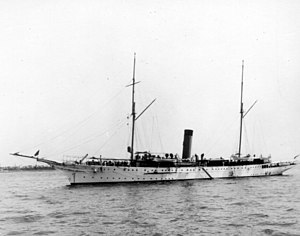USS Mayflower (PY-1)

USS Mayflower
|
|
| History | |
|---|---|
| Name: | USS Mayflower |
| Builder: | J & G Thomson, Clydebank, Scotland |
| Launched: | 1896 |
| Acquired: | by purchase 1898 |
| Commissioned: | 24 March 1898 |
| Decommissioned: | 1 November 1904 |
| Recommissioned: | 25 July 1905 |
| Decommissioned: | 22 March 1929 |
| Fate: | Sold to private ownership, 19 October 1931 |
| Name: | USS Butte |
| Acquired: | by purchase, 31 July 1942 |
| Fate: | Transferred to the Coast Guard, 6 September 1943 |
| Name: | USCG Mayflower |
| Commissioned: | 19 October 1943 |
| Decommissioned: | 1 July 1946 |
| Fate: | Sold, 8 January 1947 |
| General characteristics (in US Navy service) | |
| Displacement: | 2,690 long tons (2,730 t) |
| Length: | 273 ft (83 m) |
| Beam: | 36 ft (11 m) |
| Draft: | 17 ft 2.5 in (5.245 m) |
| Speed: | 17 kn (20 mph; 31 km/h) |
| Complement: | 171 |
| Armament: | 6 × 6-pounder guns |
USS Mayflower (PY-1) (later as USCGC Mayflower (WPG-183)) was the second ship in the United States Navy to have that name. Mayflower—a luxurious steam yacht built in 1896 by J. and G. Thompson, Clydebank, Scotland for millionaire Ogden Goelet who died on board the Mayflower in August 1897.
With the Spanish–American War requiring that the Navy expand rapidly, she was purchased by the Navy from Goelet's estate and commissioned at the New York Navy Yard as the USS Mayflower on 24 March 1898 with Commander M. R. S. McKensie in command.
The Mayflower joined Admiral William T. Sampson's squadron at Key West, Florida on 20 April. Two days later, the squadron sailed to blockade Havana, Cuba. En route, Mayflower captured the Spanish schooner Santiago Apostol. She also took a number of fishing boats and coastal trading vessels. On 11 May, she boarded a large British merchant steamer, which also carried the name Mayflower, and sent the blockade runner to the United States under a prize crew. On the 14th, Alfonso led two Spanish gunboats out of the harbor hoping to break through the American blockade. Mayflower's guns engaged the Spanish warships and drove them back to shelter under the guns of Morro Castle. For the rest of the war, Mayflower guarded the ports of Santiago de Cuba and Cienfuegos.
Early in 1899, the yacht steamed to New York where she decommissioned on 2 February to be fitted out for special service in Puerto Rican waters. She recommissioned on 15 June 1900, with Commodore Duncan Kennedy in command. At San Juan, she served as headquarters for the government of the island being formed by the first American Governor Charles H. Allen.
...
Wikipedia
